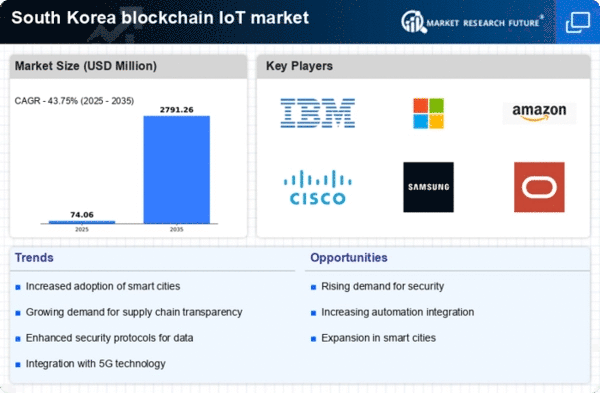Advancements in Smart Contracts
The evolution of smart contracts is significantly influencing the blockchain iot market in South Korea. These self-executing contracts facilitate automated transactions and processes, reducing the need for intermediaries. As industries adopt IoT devices, the integration of smart contracts can streamline operations, enhance efficiency, and minimize costs. In 2025, the market for smart contracts is projected to grow by 25%, driven by their ability to automate complex processes in sectors such as supply chain management and healthcare. This advancement not only simplifies transactions but also fosters transparency and accountability, which are crucial for the blockchain iot market.
Rising Demand for Data Integrity
The blockchain IoT market in South Korea is experiencing a notable surge in demand for data integrity solutions. As industries increasingly rely on IoT devices for critical operations, the need for secure and tamper-proof data becomes paramount. This demand is driven by the growing awareness of data breaches and the potential financial losses associated with them. In 2025, it is estimated that the market for data integrity solutions could reach approximately $1.5 billion, reflecting a compound annual growth rate (CAGR) of around 20%. This trend indicates that businesses are prioritizing the implementation of blockchain technology to ensure the authenticity and reliability of their data, thereby enhancing trust among stakeholders in the blockchain iot market.
Emergence of Decentralized Applications
The rise of decentralized applications (dApps) is reshaping the landscape of the blockchain iot market in South Korea. These applications leverage blockchain technology to provide enhanced security, privacy, and user control. As businesses seek to harness the power of IoT, dApps offer innovative solutions that can operate independently of centralized systems. In 2025, the market for dApps is expected to grow by 40%, driven by their potential to revolutionize various sectors, including finance, healthcare, and logistics. This trend indicates a shift towards more resilient and user-centric applications within the blockchain iot market.
Increased Focus on Supply Chain Transparency
Supply chain transparency is becoming a critical focus for businesses in South Korea, particularly in the blockchain iot market. Companies are increasingly recognizing the importance of tracking products from origin to consumer to ensure quality and compliance. The integration of blockchain technology allows for real-time tracking and verification of goods, which can significantly reduce fraud and enhance consumer trust. In 2025, it is anticipated that the blockchain iot market will see a 30% increase in applications related to supply chain transparency, as organizations strive to meet consumer demands for accountability and sustainability.
Government Initiatives for Technological Adoption
The South Korean government is actively promoting the adoption of blockchain technology within the IoT sector. Various initiatives and funding programs are being introduced to encourage research and development in the blockchain iot market. For instance, the government has allocated approximately $200 million for projects aimed at enhancing the integration of blockchain with IoT applications. This support is likely to accelerate innovation and attract investments, thereby fostering a conducive environment for the growth of the blockchain iot market. As a result, businesses are more inclined to explore blockchain solutions, knowing that they have governmental backing.
















